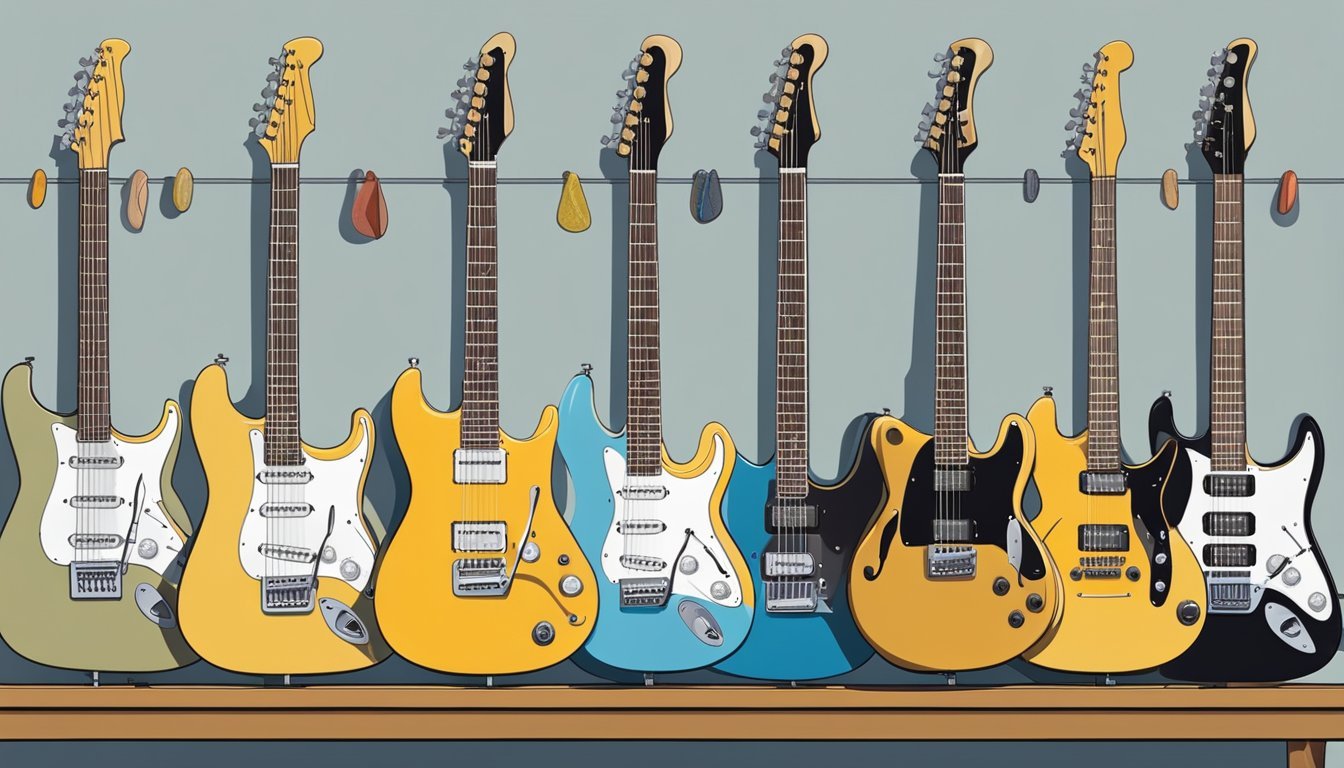Choosing the right electric guitar can feel overwhelming, but it doesn’t have to be.
Your playing style, budget, and the music you love will help you find the best electric guitar for you.
Whether you’re a beginner or looking to upgrade, knowing what suits your needs makes all the difference.

With so many models and brands out there, it helps to narrow down your choices based on what features matter to you.
From tone quality to body style, understanding these elements will guide you towards a guitar you’ll enjoy playing.
Don’t forget about the accessories and maintenance that come with owning a guitar.
Having the right tools can enhance your overall experience and keep your instrument in top shape.
Key Takeaways
- Identify your needs to find the right electric guitar for your style.
- Different models and features affect your playing experience and tone.
- Essential accessories can enhance your guitar experience.
Determining Your Needs
When choosing an electric guitar, it’s important to consider your specific needs.
This includes the type of music you want to play, the style of guitar that suits you, and how much you’re willing to spend.
Music Genre and Playing Style
Different music genres often call for different guitar features.
If you’re into rock and roll, a solid-body guitar is a great fit.
Models like the Fender Stratocaster or Gibson Les Paul offer great sustain and distortion.
If jazz is more your style, consider a hollowbody or semi-hollowbody guitar.
These guitars have a warmer tone and are perfect for smooth melodies.
Think about how you plan to play, too.
Are you more of a rhythm player or a lead guitarist? Lead players may prefer guitars with higher fret access, while rhythm players might appreciate a sturdy body for strumming.
Guitar Body Styles
The body style of a guitar greatly influences its sound and playability.
Solid-body guitars, like the classic Les Paul, provide excellent feedback control, making them ideal for electric rock sounds and heavy music.
Hollowbody guitars, on the other hand, produce a rich, resonant tone.
They’re often favored by jazz musicians.
Semi-hollowbody guitars bridge the gap, offering versatility for various styles and a good balance between warmth and sustain.
Consider choosing a guitar body style that fits your music genre.
If you plan to play live often, a lighter body might be more comfortable.
Budget Considerations
Your budget is a key factor in choosing a guitar.
Electric guitars can range from a few hundred dollars to several thousand.
It’s important to determine how much you can spend before you start shopping.
Set a budget that allows for not just the guitar but also accessories like an amp, picks, and a case.
If you’re a beginner, look for quality budget models; many brands offer great options without sacrificing sound, like Squier or Epiphone.
Don’t forget that you can always upgrade later.
Investing in a solid entry-level guitar can get you started without breaking the bank.
Keep in mind, a good guitar is a rock and roll machine that can last for years if taken care of properly.
Popular Electric Guitar Models
When choosing an electric guitar, it helps to know about some of the most popular models out there.
Whether you’re into rock, blues, or jazz, there are some standout guitars that can fit your style and need.
Fender Favorites
Fender is well-known for guitars that suit many playing styles.
The Stratocaster is one of their most famous models.
It features a contoured body and three single-coil pickups, giving you bright and versatile tones.
Many players enjoy its comfort and playability.
The Telecaster is another classic Fender model.
It has a simple design but delivers a punchy sound that works great for country and rock.
If you’re looking for something more affordable, Squier offers great budget-friendly options that capture the essence of these Fenders without breaking the bank.
Gibson Classics
Gibson is another legendary brand.
The Les Paul is perhaps their most iconic guitar.
Known for its thick tone, it’s favored by rock guitarists for good reason.
Its solid body and humbucker pickups provide a rich, warm sound.
Another notable model is the Gibson SG.
This guitar has a lighter weight and a fast neck, making it a great choice for shredders.
If you want something more affordable, check out Epiphone, which offers well-made copies of these classic Gibsons at a lower price.
Other Notable Brands
Besides Fender and Gibson, there are plenty of other brands to consider.
Gretsch guitars are famous for their unique sound, often used in rockabilly music.
Many players love their hollow-body designs.
Ibanez is known for their fast-playing guitars.
The Jackson American Series Soloist SL3 is a great choice for those who play metal or hard rock due to its aggressive sound and sleek design.
If you’re looking for versatility, the PRS SE Custom 24 is popular for its wide range of tones.
Rickenbacker also offers distinct guitars, particularly in the rock scene.
Finally, D’Angelico provides beautifully crafted guitars that catch the eye.
All these brands offer something unique to enhance your playing experience.
Features and Specifications
When choosing an electric guitar, you’ll want to pay attention to the features and specifications.
These details can significantly affect playability, sound, and overall satisfaction with your instrument.
Here are the key components to consider.
Neck and Fretboard Materials
The neck and fretboard materials make a big difference in your playing experience.
Common neck woods include maple, which offers a bright tone, and mahogany, known for a warmer sound.
If you prefer a smooth feel, rosewood or ebony fretboards are great picks.
Different neck shapes, like C-shaped or U-shaped, can influence comfort.
A bolt-on neck allows for easier replacement, while a set neck provides better sustain.
Don’t forget to check the fret ends; well-finished ends are easier on your fingers.
You can also look for features like a truss rod for neck adjustments, ensuring your guitar stays in top shape.
Pickups and Electronics
Pickups play a crucial role in determining your guitar’s sound.
You’ll typically find single-coil and humbucker options.
Single-coil pickups are known for their clarity but can be noisy, while humbuckers offer thicker tones and less interference.
Evaluate the electronics like pots and switches to ensure reliability.
A five-way switch lets you access different pickup combinations, which can broaden your sound options.
You might also consider active pickups for enhanced power and clarity.
Choosing the right pickups can transform your playing style and the genres you can cover.
Hardware and Build Quality
Quality hardware can significantly impact playability and tone.
Look for components made from durable materials like chrome or stainless steel.
Good tuners help keep your guitar in tune, which is essential for any musician.
The bridge type can also affect sustain.
A fixed bridge offers stability, while a tremolo system allows for pitch bending.
Also, examine the body wood; lighter woods like alder or poplar can provide a balanced tone, whereas heavier options like korina can enhance sustain.
The build quality of your guitar affects its longevity and performance, so it’s worth investing in well-constructed models.
Accessories and Maintenance

When you get your electric guitar, there are important accessories you’ll need.
Knowing how to maintain it will help keep it in great shape for years.
Here’s what you should consider.
Essential Accessories
Here are some must-have items for your electric guitar setup:
-
Amplifier: A quality amp is crucial for getting great sound. Brands like Fender and Marshall offer reliable options.
-
Picks: You’ll want a variety of picks. Thin ones can be great for strumming, while thicker picks work well for solos.
-
Strap: A comfortable strap is important, especially if you play for long periods. Look for one that fits your style.
-
Tuner: An electronic tuner helps you keep your guitar in tune easily. Consider a pedal tuner if you plan to play on stage.
-
Guitar Cables: These connect your guitar to the amp. High-quality cables can reduce noise and signal loss.
-
Capo: A capo lets you play in different keys without changing fingerings.
-
Effects Pedals: If you’re into experimenting with sound, pedals like reverb or distortion can add character.
You can find these essentials at a local guitar store or online at places like Sweetwater.
Taking Care of Your Guitar
Maintaining your electric guitar is as important as playing it.
Here’s how to keep it in top condition:
-
Clean Regularly: Use a soft cloth to wipe down the body to prevent dust buildup. For the fretboard, a little fret polish can keep it smooth.
-
Humidity Control: Keep your guitar away from extreme temperatures and humidity. Too much moisture can damage the wood.
-
String Changes: Regularly change your strings based on how often you play. Fresh strings make a big difference in sound.
-
Check Pickups: If you have single-coil pickups, ensure they’re well-adjusted. They can pick up unwanted noise if not set properly.
-
Maintenance Tools: Investing in a good guitar tool kit allows you to perform small repairs at home.
With the right accessories and maintenance, your guitar will sound great and last longer.
Frequently Asked Questions
When you’re looking into buying an electric guitar, it’s normal to have a bunch of questions.
Here’s a quick look at some common concerns and helpful tips to guide you in your guitar journey.
What’s the best electric guitar for a complete beginner?
For beginners, models like the Fender Squier or Epiphone Les Paul are great choices.
They offer quality sound and are budget-friendly, making them perfect to start with.
These guitars are versatile, allowing you to explore different music styles.
How do I choose the right size electric guitar for me?
Choosing the right size is important for comfort and playability.
Generally, smaller players might prefer a shorter scale guitar, while larger players can handle standard sizes.
Trying out different sizes in a store can help you find what feels best.
What should I look out for to avoid a bad purchase in electric guitars?
Inspect the guitar for signs of damage, like cracks or warped necks.
Also, check the hardware, like tuning pegs and pickups, to make sure they function correctly.
Reading reviews and asking questions can also help you avoid poor-quality instruments.
Which electric guitar brands are considered top-notch?
Some of the most respected brands in electric guitars include Fender, Gibson, and Ibanez.
These brands are known for their craftsmanship and sound quality, making them reliable choices for both beginners and advanced players.
In addition to electric guitars, many musicians also seek out high-quality acoustic instruments.
For those just starting out, finding the best acoustic guitar for beginners can set the foundation for a lifelong passion for music.
Brands like Yamaha and Taylor are also highly regarded, producing guitars that combine playability with excellent tone, ensuring that players of all levels can find the right fit for their needs.
Can I get a solid electric guitar without breaking the bank?
Yes, you can find great electric guitars at affordable prices.
Look for budget models from reputable brands that provide good quality without a hefty price tag.
You can often find good deals online or at music stores.
Any recommendations for an electric guitar suitable for professional gigs?
For professional settings, consider models like the Fender Stratocaster or Gibson Les Paul.
Both are known for their versatility and sound quality.
They can handle various music styles, making them excellent choices for live performances.

